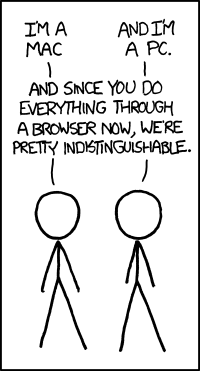 |
| Image via xkcd |
Sure, most of what I do is in the cloud. I could write all my blog posts directly into Blogger’s editor, but I usually prefer to type it out in Kate. However, my email, RSS feeds, most of the music I listen to, and even most of the videos I watch are all in the cloud. On the rare occasion I need a word processor or need to manipulate a spreadsheet I prefer to use LibreOffice, but I could just about as easily get by using Google Docs. For some reason though, I like to keep my archives local and backed up across multiple hard drives and I don’t like for my entire life to revolve around Google.
However, I’m sure just about all of us spend most of our time in the cloud. That really makes it so the only software you interface with is your web browser and a few plugins. In that kind of environment what operating system you use doesn’t make much of a difference. That in mind, let’s look at the options:
- Microsoft Windows – Prone to security vulnerabilities and gets severely bloated over time requiring regular reinstallation. On the other hand, most cheap computers come with it.
- Mac OS X – While it’s both secure and stable, it will only work on a Macintosh computer and they charge top dollar for outdated hardware.
- Linux – Due to a common Unix heritage, it has the same stability and security as OS X, however it will run on any hardware, even old machines, and it’s free.
If life really is in the cloud, then it would seem that Linux would be the perfect operating system for most people. Even though I stopped using Ubuntu a few months ago, it is a really simple, user friendly Linux distribution that I owe a debt of gratitude to. Its definitely worth a try.
On the other hand, if what you have works and you do everything through a browser then it wouldn’t make much of a difference.
